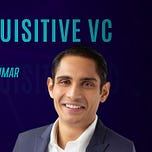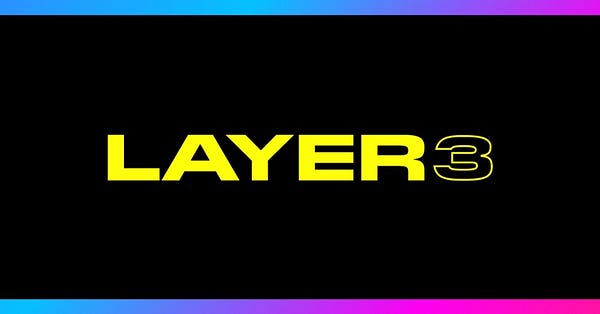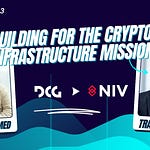Brandon Kumar is a co-founder of Layer3, a platform that enables anyone to contribute to decentralized autonomous organisations (DAOs). Prior to this Brandon was a Vice President at Accolade Partners a fund of funds, where he focused on investments in crypto funds.
We talk about Brandon’s journey from investing to founding a company, DAOs, Layer3, raising money and more!
The podcast is also available on your favourite podcast sources like Spotify, Apple and Youtube!
NA: Thanks for jumping on, I appreciate you taking out the time. I wanted to start with your time at Accolade. How was that and what would you say were your biggest learnings?
BK: Yeah, so for a little bit of context joined Accolade when I was actually an undergrad, so that was 2014. I was studying Economics at George Washington University and was spending pretty much half of my week at Accolade. And at the time they didn't have a dedicated crypto effort.
So, I was spending most of my time on the venture side of things, but also on growth equity and traditional lower middle market buyout, across technology and healthcare in 2017 in the firm made its first fund investment in a crypto fund, it was Andreessen's first dedicated crypto effort.
And that sort of earmarked my foray into the space because I started to just pay attention to it recreationally on nights and weekends. In 2019 we had been following the space passively and it became very clear that there were a number of changes from 2017 to 2019 that made it apparent for us to enter the space with a dedicated So the number of funds that were focused exclusively on crypto had increased massively. There was a massive talent migration from traditional Web 2.0 to Web 3.0. From a regulatory perspective, there was a lot of clarity. And so, we came to market with a $125 million fund of funds with the thesis being institutional LPs, want diversified exposure to a nascent asset class, and a fund of funds is a great tool for them to do so.
That product was impeccably timed because we made most of our early commitments right before the market started to take off right before DeFi summer happened in 2020. And a lot of different things started to find product-market fit in the industry. So, I was spending more and more of my time on that product and less and less of my time on some of the other efforts at Accolade.
And my nights and weekends started to be consumed with spending time in and around a lot of the communities that are really popular today, principally within DeFi and just figuring out ways that I can get involved beyond just being kind of like a passive investor. During DeFi summer, obviously, that meant just being an active participant in these networks, but over a longer period of time, that also meant just finding ways that I could help on the qualitative side of things, whether it was putting out content or connecting with the core contributors and doing so I realized that there was a lot broken about the contribution process within DAOs and a lot of that has to do with the fact that DAOs are relatively new and the tooling to service them hasn't really matured in the same way that the actual DAO ecosystem has.
So, there are way more DAOs than there is sophisticated tooling to manage them. And that was kind of how I got excited about the problem space that my now co-founder and I are pursuing.
Just quickly on kind of how I came to Layer3. I had connected with my co-founder in the spring of this year, at the time he was building under the same branding, a growth marketing effort for DeFi and what that meant was taking traditional web to growth marketing efforts and applying those to DeFi communities. And he had started with the Rari Capital community, which was, a project that I had been excited about and been following from afar. What he was doing really resonated with me, and so I just reached out to be an advisor. One of the concepts that he dropped was this thing called bucket-list as a service and the, the acronym was BLAAS. And the basic concept was to do things in the real world and then get rewarded for governance tokens as a result.
It became very clear to both of us that you could productize that into a coordination tool for DAOs and it also became very clear that we would make a very good team, so we decided to pursue this together. Super long-winded, but I thought that would be a helpful context.
NA: No, that's great. Why DAOs? You've been around crypto for a while now. What do you really see in the DAO space that got you really excited?
BK: Yeah. I mean, I think the dirty little secret about, about DAOs, is that the coordination model doesn't really work in a lot of places. I mean, a lot of communities taunt themselves as DAOs but in the true essence of being decentralized and open communities, they really aren't.
In many instances, it's kind of just friends, sending other friends stables or Ethereum to write blog posts or push for the community. And it's actually more of like a girls and boys club than like certain elements of traditional tech or traditional finance. And so, I think a lot of that has to do with the fact that you have kind of this barbell of contribution that exists within DAOs
On one side you have shit posters who just spend their time on Twitter and they're kind of evangelizing the brand, but they're not really getting anything out. And then on the other side, you have core contributors who maybe are paid on a quarterly or monthly basis from the DAO itself.
And I think there is a lot of idle human capital that sits in the middle and that's where I sat, where you're a passive investor in these communities. You're sophisticated enough within crypto to understand what it is that they're trying to accomplish, but you just don't have the tools to participate.
You're not going to spend the time and effort to actually figure out what the contribution process is. Like I often will say that contributing to a DAO is the virtual equivalent of climbing through barbed wire. You have to get into discord, you have to then connect with the core contributors. The tooling is a combination of Airtable, Notion, Google Sheets.
So just a really broken process, and most people aren't going to spend the time to do that because if they have a few hours in the evening, the turnaround time on that process is just too long. So, it's just a very soft part of crypto that I think there's a lot of room to build really creative things.
And I think what we're building at Layer3 will help solve the coordination side of DAOs but also help enable a lot of folks to get off the sidelines and start participating in this asset class.
NA: Fair enough. I think it's definitely an exciting space. What are your thoughts around coordination in DAOs and how final decisions are made compared to traditional tech companies? What I mean by that is you've probably heard of the Synthetix DAO and how Kain left, and then he came back saying that he wants a seat on the council to create, you know, a better direction for the DAO. How do you think that kind of plays out for DAOs over the long-term to have one leader?
BK: Yeah, look, I think there are a lot of people, much smarter than me trying to solve DAO coordination with respect to your question. And I think the honest answer is that none of us really know. You're creating like an open-source system that's trying to accomplish a lot at a ridiculously fast pace and in some ways, you do need to have a core contributing team that's sort of steering the ship.
I think over time, alongside the growth of DAO tooling, we’ll come to a place in the ecosystem where you can have folks like Kain or Robert Leshner still be kind of the figureheads of their communities, but for them to really have no formal decision-making power, it's basically them saying, Hey, this is what I think the community should do.
And then the community looks to folks like that to actually pursue it. But by no means, can that person be sort of a stopping force on the progress of what they're trying to accomplish?
NA: Yeah, sure. That's fair enough. What would you say is the vision that you have for Layer3 over the next five years? Where do you see it going?
BK: Yeah. So, I mean, our go-to-market is creating a marketplace where on one side you have DAOs and we're starting primarily with DeFi DAOs, but we do hope to expand you know, NFT community, social communities. And then on the other side of that marketplace, you have contributors like you and me who have, you know, maybe an hour or two after we finish our day jobs or on the weekends where we want to get involved and basically earn our way into governance.
And those contributors come to our marketplace, they complete, and claim tasks and they earn these governance tokens for doing so. Over time, what we plan to do is begin decentralizing elements of this. So, in sort of six months, what we hope to do is say, well, if you have contributed a certain number of tasks, you can now validate tasks on the Layer3 platform.
And so now you're creating an environment where peer validation occurs. So, you come to the platform, you complete a task. I, as a validator, can also come and earn crypto by validating that you actually did that. And then in the final state, what we hope to create is a protocol where anyone can come to Layer3 post an atomic task, another person can come, claim and complete that task, and then it's validated by a third party in a completely decentralized permissionless way.
So, you're creating an environment where you can validate very bespoke, very atomic off-chain behaviour on-chain, and that can then be coupled with an on-chain resume to allow you to do other things in the ecosystem.
I think right now when you look at sort of the landscape of projects that are going after something like this Rabbit Hole is doing an incredible job of building an on-chain resume. So, you do on-chain behaviour and you earn governance tokens. We are trying to create essentially the same thing, but you're doing off-chain behaviour and you're earning governance tokens and I think that's powerful.
NA: Yeah, definitely. The whole on-chain resume thing is definitely going to be the future of hiring, in Web 3.0, no doubt. You've been on the other side of this world where you are investing into funds and you've seen how venture funds work and now you've seen how DAOs work. There is a range of investment DAOs in this space, actively making investments. There's a lot of talk about how investment DAOs are the future of venture capital. What are your thoughts on that?
BK: Yeah, I have mixed thoughts on this because I think one of the beliefs that we had at Accolade is that if you are a truly incredible investor, you have independent thinking and independent thinking, and contrarianism is a very hard thing to foster in a DAO by pure virtue of the fact that you need consensus to make investments.
So I think in a market environment as we've seen over the past 18 months, those communities will do really well because you're enabling folks to participate in the upside when everything seems to be doing well.
But, in a bear market, it will be interesting to see how they go about sustaining because when you look at some of the best crypto native venture firms, they were making very contrarian bets in bear markets. And those bets, they were only able to make because of the structure that they were operating in, which meant that they were a traditional fund structure and their investment committees had built in the policies that enabled people to make investment decisions without broader consent.
And I think that over multiple decades and multiple asset classes has always been a recipe for success within those types of firms. And so, you're going to have to figure out a way to implement the rules within investment DAOs to enable that same type of decision-making.
NA: Yeah, that's a great point. What about the point that most DAOs will eventually become investment DAOs because of the treasuries that they manage?
BK: I think there is a massive white space for sound DAO treasury management and that's why we're building what we're building. DAOs today can't find enough productive places to put their treasuries to work.
That has a lot to do with just poor coordination tools and poor treasury diversification tools. Yeah, I mean, the fact that there are some multi-billion dollar, market cap projects that have billions of dollars in the native token on their balance sheet is very concerning. And I think it's one of those lessons that unfortunately we're going to have to learn when the market turns and the price of those assets capitulates, and then the balance sheet kind of capitulates alongside that. Then from that, I think people will be forced to think a little bit more quantitatively and rationally about how they go about allocating those funds.
NA: After spending a long time investing in venture funds, you ended up raising money for Layer3. How was that experience being on the other side of the table?
BK: Yeah. I mean, I think it's no secret that it's a great time to be a founder in the current market. There are a lot of funds being raised and I saw that, and I felt that at Accolade and we were kind of in the pole position to be one of the first calls that a lot of those funds made. So, I was in a fairly privileged sheet and understanding how they think about things.
And then when I was on the other side, I mean, like, you know, anecdotally what I'll say is that the funds that had the best reputation from the LP side certainly match that when you're on the other side of the table, pitching them, they have a great way of just connecting with founders, asking the right questions, adding value, whether they invest or whether they don't and just continuing to develop and invest in that relationship.
So, yeah, I mean, generally speaking, I think for the next few months, until, you know, whether regulation comes out or something causes the market to cool off, it'll be just a great time to be raising capital. So, for me, I kind of came out of the gates with just a good Rolodex of folks to call on, and I knew exactly who I wanted to spend time with and it ended up working out in a pretty painless way.
NA: Is there any advice you could give to founders who are pre-product, pre-revenue trying to raise right now?
BK: Yeah, look at the end of the day, you want to construct a round of folks that you think are going to be there when, as I said, I've mentioned this a few times in this interview, but when the market turns, you want to make sure that you have folks that are in your corner.
I think you see a lot of founders from time to time, go and race for maybe one or two funds and, you know, funds who shall remain nameless will typically try and take the whole round. And I think that's a really bad dynamic. You want to construct a round where you have a healthy balance of funds where their check size is meaningful relative to their fund size, but also you have angels there because both of those types of investors can really be valuable when shit starts to hit the fan.
So, my primary piece of advice is just to be patient. Make sure you get the optimal round construction. Don't go with the first person that offers you a term sheet. Then the second thing is that if you don't find success early on, just be persistent, you know, continue iterating. There are plenty of ways to raise money in crypto today, you can get grants committees to fund you with $25-50K checks, just to bootstrap your way until you get to a larger seed or a larger series a.
NA: Yeah, that's some great advice. And is there any advice that you could give someone new to crypto? How they could probably handle wading into the waters since crypto's quite a big thing now there's a lot of different areas to look at the DeFi, NFTs. How do you as well personally, keep track of what's really going on?
BK: Yeah. I mean, for me, I think the best way to do it is to start paying attention to just a handful of communities. So, from an investment perspective, you know, don't try and get fancy, set an allocation that you think makes sense, and is going to kind of capture the upside regardless of what happens in certain pockets of the ecosystem.
And then from a participation perspective, find a few projects that really resonate with you and just spend time in their discords. Founders and core contributing teams are incredibly accessible, so ping them, ask them questions, find ways to get involved. And then from there, you will invariably find what it is that excites you most about this space.
And maybe that'll end up pushing you to leave wherever you are currently, whether it's like a Web 2.0 tech job or traditional finance and enter crypto full-time. So, kind of the generic advice, but I do generally speaking think that that's the best approach.
NA: No, that's a great point. Finally, could you talk about what is a secret obsession of yours that not many people know about
BK: Is this within crypto or outside of crypto?
NA: Anything, whatever you think might be interesting.
BK: I don't know if this is a secret obsession, but I will say that. I think spending time, like COVID in particular forced people to spend a tremendous amount of time in front of screens.
For me, one of my biggest hobbies is endurance sports. I'm forced to unplug and spend two hours getting a workout in. So, I like to do long-distance running, long-distance biking, swimming, those types of things.
And I think a lot of people don't realize the clarity that comes from having just two hours, not looking at a screen or just not having any type of input. And so, yeah, that's kind of like an obsession of mine. And so, I always try and carve out the time to make sure that I have that.
NA: That's a great point and a great reminder to take a little bit of a break.
BK: Yeah, exactly.
NA: That's all I had Brendon, thanks so much for jumping on, I had a great time talking about the details of DAOs and how Layer3 is going to make things very different.
BK: Yeah, no, this was a great conversation and I appreciate the questions.
Follow me, Brandon and Layer3 on Twitter here.
Disclaimer: The Inquisitive VC is provided for informational and educational purposes only and is not intended to provide commercial, financial or legal advice. Nothing in this article constitutes an offer of securities or regulated financial products or financial services to any persons or a solicitation to buy or sell any tokens or securities or to make any financial decisions. Do not trade or invest in any project, tokens, or securities based upon this podcast episode. The host may personally own tokens that are mentioned on the podcast.

















